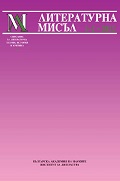„Албанската връзка” на Григор Пърличев
Grigor Părličev’s “Albanian connection”
Author(s): Raymond DetrezSubject(s): Literary Texts
Published by: Институт за литература - БАН
Keywords: Grigor Părličev; Literature; Albanian heroes
Summary/Abstract: In 1860, Grigor Părličev, a Bulgarian from Ohrid in Macedonia, won the prestigious yearly Athenian poetry contest with the romantic epic poem in archaic Greek O Armatolos (An armatole is a kind of Ottoman policeman recruited among the Christian population of the empire.) The poem describes the exploits of an Albanian armatole and a number of Albanian robbers, who are all represented in a remarkably flattering way. However, in an endnote Părličev explicitly states that all Albanians are actually Greeks. Two years later, he again participated in the Athenian poetry contest ― this time unsuccessfully ― with another epic poem, Skenderbeïs, dealing with an episode in the life of the Albanian national hero Skander beg and his resistance to the Ottomans. One may wonder why a Bulgarian pays tribute to Albanian heroes in Greek poems. One explanation is that Părličev during his stay in Athens in the 1850s and the early 1860s had adopted to a large extent the Greek national ambitions, which implied that all Orthodox Christians with some knowledge of Greek were actually Greeks. Precisely at the time of Părlicev’s participation in the poetry contest, Albanian intellectuals like Thimi Mitko, Anastas Byku, Jani Vreto and others argued that Albanians and Greeks had common ancestors and actually constituted one single people. Părličev obviously supported their ideas. However, as a closer reading of both poems indicates, Părličev was in fact more interested in the religious aspect of the conflicts he described. Actually, he displayed a pre-national (or pre-nationalist), religious Balkan identity rather than identifying himself completely with a particular ethnic or national community.
Journal: Литературна мисъл
- Issue Year: 2012
- Issue No: 1-2
- Page Range: 25-35
- Page Count: 10
- Language: Bulgarian
- Content File-PDF

